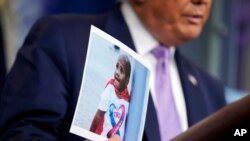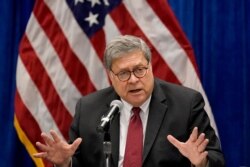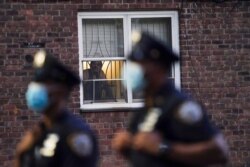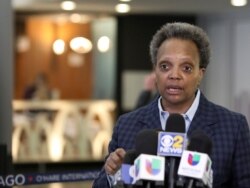More than 6,000 arrests.
Over 2,600 gun confiscations.
Hundreds of kilos of illegal drug seizures.
Before he stepped down last month, Attorney General William Barr touted these results of Operation Legend, a federal law enforcement initiative he launched this summer, beginning in Kansas City, Missouri, to help major U.S. cities combat an unprecedented spree of killings.
Named for 4-year-old LeGend Taliferro, who was shot and killed while he slept at his Kansas City home on June 29, the $60-plus million initiative targeted nine violence-wracked cities with coordinated federal, state and local law enforcement efforts.
Hundreds of agents from the FBI, Drug Enforcement Administration (DEA), and other federal law enforcement agencies teamed up with local police in these cities to crack down on violent criminals, make arrests and get firearms off the streets.
“By most standards, many would consider these results as a resounding success. Amid a global pandemic, the results are extraordinary,” Barr said in a statement.
Left unsaid, however, was whether the government operation achieved its ultimate goal of curbing violence. On that score, the record is anything but spectacular. While a couple of metropolitan areas saw brief declines in their homicide rates this summer, killings continued to surge throughout the nine targeted cities and beyond.
According to police data compiled by VOA, homicides during 2020 were up by an average of about 40% over the previous year across the nine cities: Kansas City, Missouri; Chicago, Illinois; Albuquerque, New Mexico; Cleveland, Ohio; Detroit, Michigan; Milwaukee, Wisconsin; St. Louis, Missouri; Memphis, Tennessee; and Indianapolis, Indiana.
Milwaukee saw the greatest increase in murders year to date — 99% — followed by Chicago at 55%; Memphis at 50% and Cleveland at 42%.
Moreover, the violence did not let up in the wake of Operation Legend. For example, when Legend expanded to Chicago in late July, homicides were up 51% in the city, year to date. But by late December, that rate crept up to 55%. Only Albuquerque saw a slight decline, although there, too, the homicide rate was on track for a new 2021 record.
The spike in murders was not limited to these cities. Homicides in 57 major U.S. cities jumped by an average of 36.7% through late last year, according to data compiled by crime analyst Jeff Asher, with several cities setting records.
Experts say the violence was fueled by a perfect storm of forces: a deadly pandemic, a severe economic downturn, and anti-police protests over George Floyd’s death in May while in the custody of Minneapolis police.
“Because violence in general and firearm crimes in particular tend to be spontaneous acts, added strain and stress increases the likelihood that people are going to snap,” said Ken Novak, a criminology professor at the University of Missouri-Kansas City.
With violence spiraling in major U.S. cities, “some type of intervention was probably needed,” Novak said. But he cautioned against reading too much into the latest crime data.
"I'm not certain that anybody is going to be able to say with a high degree of confidence that Operation Legend either worked or didn't work," he said.
Thaddeus Johnson, a former senior law enforcement official in Memphis and now a criminologist at Georgia State University, said the stubbornly high rates of homicides underscore the futility of short-term arrest-and-prosecute crime-fighting initiatives.
“If we don't address community problems or we don't provide community supervision when (convicted criminals) get out of prison, we're going to just have this cycle continue, and all we’ve done is put a Band-Aid on a cancer of sorts,” Johnson said.
When Operation Legend was rolled out in July, President Donald Trump, campaigning for re-election, touted the program as his administration’s response to the problem of violence in cities run by Democrats. He pledged to “restore public safety, protect our nation’s children, and bring violent perpetrators to justice.”
Early successes
To be sure, the operation had some early successes. Within five weeks of its launch, a 22-year-old man was arrested and charged with Legend Taliferro’s murder. Charron Powell, Taliferro’s mother who became a staunch defender of the program, praised law enforcement.
“Let’s do that for other cases, and stop things like this from happening,” Powell said after the arrest of the suspect in her son’s death.
A week later, police had suspects in two other high-profile murder cases in Cleveland and Albuquerque. The arrest in Cleveland of a suspect in the killing of Eric Hakizimana, a 17-year-old refugee from Congo, came after the local U.S. Attorney’s office took over the case.
Mayelle Ngemba, a family friend of Hakizimana, said the case had languished for months and that without federal law enforcement assistance, the killer “would still be out there, because the city is overwhelmed with so many crimes.”
For local police, “this would have been like, ‘Yeah, the kid is dead. What should we do?’” Ngemba said in an interview.
Rick Smith, chief of police in Kansas City, said the more than 200 federal agents working with his police officers focused on arresting “people that were absolutely involved in violent crime.”
“It was a very technical look at who was committing crime in our city, what gun charges we could have and what federal crimes they could be charged with if we caught them,” Smith told VOA.
As a result, he said, homicides in Kansas City declined from about six per week before Operation Legend to two per week at the end of the 10-week operation. Smith acknowledged that homicides continued to rise in 2020 — to 174 from 151 in 2019 — but said “the number would have been much worse had we not had Operation Legend.”
The surge in federal agents has enabled Kansas City police to make arrests in as many as 70% of murder cases, producing a deterrent effect, according to Smith.
“We're sending the right message here in Kansas City — 'Hey, if you're going to get involved in this violent crime, there's a good chance you're going to be held accountable for it,’” Smith said.
Skeptics
In other cities, Barr’s praise of Operation Legend’s success was met with greater skepticism. In September when the then-attorney general claimed that Legend helped reduce homicides by 50% over a five-week period, Chicago Mayor Lori Lightfoot said it was “just factually inaccurate.” In October, St. Louis Circuit Attorney Kimberly M. Gardner accused Barr of using “bogus, short-term” stats to claim a 49% drop in homicides in the city.
Teny Gross, executive director of the Institute for Nonviolence in Chicago, said Barr’s claim was “completely disregarded.”
“Clearly, the number in all American cities, as well as Chicago, are very, very high,” Gross said.
What is more, taking out established gang leaders can have a destabilizing effect, as new criminal elements jockey to fill the power vacuum, experts say.
“There's a strong sense of people I work with that previous federal operations that took out the leaders of organized groups created chaos,” Gross said. “And people are really saying that that's part of the reason Chicago has stayed violent.”
The Rev. Charles Harrison, president of the Indianapolis Ten Point Coalition, a faith-based anti-violence group, said that while Operation Legend resulted in a large number of arrests and gun confiscations, "it did not really significantly reduce the level of homicides that the city has experienced in 2020."
With no arrests made in nearly half the homicide cases, “individuals on the streets don't believe that there is going to be any accountability for them being involved in some kind of violent act,” Harrison said.
“What we're seeing a lot of across the country is that there's a lot of street justice taking place, where if police are not making arrests and the streets know who did it, then eventually there's going to be some kind of retaliation,” he said.
Criminologist Novak said that while locking up chronic offenders can have an “incapacitation effect,” the operation is unlikely to deter criminals.
“Since it was always supposed to be a brief surge, why would we think it's deterring behavior now?” he said.








